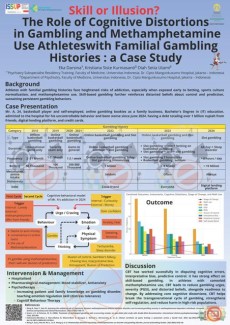Skill or Illusion? The Role of Cognitive Distortions in Gambling Disorder and Methamphetamine Use Among Athletes with Familial Gambling Backgrounds

Introduction
Athletes with extensive sports knowledge may falsely believe that gambling outcomes can be predicted with skill. This cognitive distortion, combined with methamphetamine use and familial gambling exposure, increases the risk of gambling disorder (GD). Changes in the type of gambling also indicate an increase in impulsivity. This article will show how cognitive biases, substance use, and familial influence contribute to gambling disorder in an athlete.
Case
A 24-year-old professional basketball player with GD and methamphetamine use disorder (MUD). The patient is unable to control the desire to gamble, important activities are neglected, continues to gamble even though it is prohibited and knows it has a bad impact on him.
These athletes demonstrate illusion of predictability in GD. Family involvement in the gambling industry further normalizes gambling
Discussion
Gambling disorders have similar neurobiological mechanisms to substance abuse disorders, namely dysregulation of the Hypothalamic-Pituitary-Adrenal (HPA) Axis and a decrease in the amount of Brain-Derived Neurotrophic Factor (BDNF) which results in increased sensitivity to addictive stimuli. There was a link between the use of methamphetamine which is classified as a psychostimulant and gambling disorders. A study found that 16.9% of psychostimulant users reported experiencing gambling disorders. 11 Another study found that 33.3% of individuals who were dependent on methamphetamine also experienced gambling disorders.
Conclusion
Addressing gambling addiction in athletes requires cognitive therapy to dismantle skill-based illusions and substance use treatment. Family-based interventions are crucial for breaking the cycle of intergenerational gambling normalization.